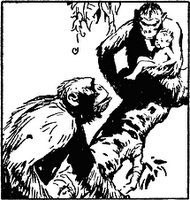Forget Calvin. This is Rousseau and Hobbes.

From the Daily Telegraph in the UK (via BoingBoing) comes this tale of Oxana Malaya, a Ukranian woman who “was brought up by a pack of dogs.” Super interesting. Super weird. And super sad. But I put the scare quotes up there because I also think these situations are super complicated and often get discussed with a distorting simplicity.
I think stories of feral children, kids raised by wolves or, like Tarzan, by apes, are fascinating because they lay bare a basic human need, the need to be nurtured and loved, and juxtapose it with a perveted form of society in which animals distort our humanity. And although the temptation to draw a lot of meaning from these stories is strong, I don’t think the reality reveals anything too deep about our human character. It certainly doesn’t, as the Telegraph story puts it, “resolve the nature-nurture debate.”
One thing the story of Malaya does well is explode the fairy-tale romanticism that can surround children-raised-by-animal stories. Feral kids are really the victims of horrific neglect and abuse. Malaya’s parents were alcoholics incapable of caring for her and apparently unconcerned when their toddler began living with a pack of dogs on their property. This doesn’t make sense to me, and I suspect it is a story massaged by Malaya or her father (the mother is gone). The child hadn’t disappeared, afterall; she was living in the backyard! Not too hard to come get her in one of your sober moments. I think it is more likely that the family kept the child with the dogs as an insane form of punishment.
Malaya was later rescued from this treatment, and here’s where the nature vs. nurture hypothesizing begins.A shameful five years later, a neighbor reported a child living with animals. When she was found, at the age of eight in 1991, Oxana could hardly speak and ran around on all fours barking, mimicking her carers.
Today, Malaya is 23 and lives in a home for the mentally disabled. Although she can speak, her language has “no cadence or rhythm or music.” She “looks uncoordinated and tomboyish.” When she walks, “you notice her strange stomping gait.”
Though she must have seen humans at a distance, and seems occasionally to have entered the family house like a stray, they were no longer her species: all meaningful life was contained in a kennel.
Lurking behind these characterizations is the nurture side of the debate. Malaya is like an animal because she wasn’t nurtured properly. She wasn’t taught how to be a human. She is a Hobbesian savage who only cares about comfort and the whereabouts of her next meal. The things that we consider human must be learned.
Yet, as I hope is clear from reading about what actually happened to Malaya, feral kids are not examples of mankind in a state of nature. They are not just children minus nurture, they are children minus nurture plus torture. They are examples of people hurt by those who should be protecting them. Just for argument’s sake: who knows what sorts of innate humanity might be positively squashed in such horrendous circumstances?
Furthermore—and to elaborate on my guess that Malaya was forced to live with dogs as punishment—what if a feral kid only becomes feral because they start out “damaged”? What if the only kids abandoned by parents and society like this are the ones who have developmental abnormalities? How then can you even begin to suggest nature vs. nurture? Everything is all mixed up together: some nature + lack of nurture + serious abuse = one seriously fucked-up human being.
This brings to mind a book by the late, great Roger Shattuck called The Forbidden Experiment, about the Wild Boy of Aveyron, a feral child discovered in France in 1800. As Shattuck delves into the “psychology, biology, history, sociology, linguistics, anthropology, philosophy” of such cases, he addresses similar concerns. Although Shattuck harbors “an unprovable belief that the Wild Boy was not organically damaged but functionally retarded by years of deprivation,” he acknowledges that a doctor at the time “attributed the boy’s wild or idiotic behavior to one of three possible causes of organic damage, none of which could be proved then or now.”
All considered, I’m not sure feral kids can tell us much about “human nature,” other than the obvious point that living like an animal messes up human development. Nature vs. nurture actually seems obsolete as a question to me, like the Cartesian dualism problem. Simplifying things can be an effective way to isolate important features of complex systems, but dichotomies like nature/nurture or mind/body don’t seem to help us understand the world very much anymore.


No comments:
Post a Comment